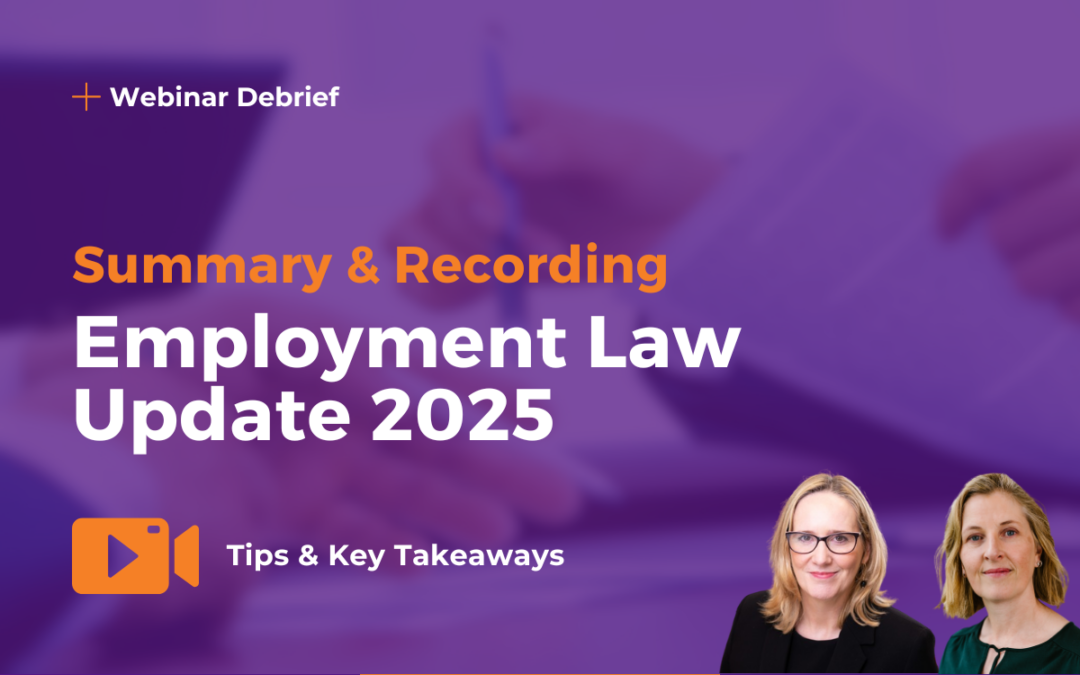Our first webinar of 2025 was a huge success, with over 350 attendees joining our very own Mary Cullen (Founder & Managing Director at Insight HR) and our very special guest, Síobhra Rush (Partner at Lewis Silkin) for an in-depth discussion on the latest HR and employment law updates. If you missed it, here’s a breakdown of the key topics covered and some of the expert insights shared.
Be sure to catch the full recording on-demand for a deeper dive into these important areas.
Pension Auto-Enrolment: What Employers Need to Know
A major topic of discussion was the long-awaited pension auto-enrolment system, set to launch on September 30, 2025. This scheme will automatically enrol employees aged 23-60 who earn over €20,000 and who are not already enrolled in a workplace pension scheme, into this pension plan. Contributions will start at 1.5% of salary, increasing to 6% over ten years, with employers required to match these contributions and the state providing an additional top-up.
“Employers need to prepare for increased administrative work, even though the government claims it will be minimal.” – Siobhra Rush, Partner at Lewis Silkin
Key considerations for employers:
- Increased administrative burden despite claims of a streamlined process.
- The potential for a split workforce between existing pension schemes and new auto-enrolled employees.
- The importance of employee education around mandatory contributions, as employees will see deductions from their pay.
- Strategies to encourage participation in existing pension schemes to avoid unnecessary complications.
Mandatory Retirement Ages: Legal Clarifications
The Mallon Supreme Court decision provided much-needed clarity on mandatory retirement ages. We explored the topic of mandatory retirement ages through the fresh lens provided by this case, outlining the key learnings and obligations that remain for employers.
- Employers must consult with employees well in advance of retirement.
- They must adhere to the Code of Practice on Longer Working, especially when offering fixed-term contracts post-retirement.
- Cases in the Workplace Relations Commission (WRC) show that clear policies and individual consultations remain critical in defending mandatory retirement policies.
“While employers can set a mandatory retirement age, they must still engage in meaningful consultation with employees approaching retirement.” – Mary Cullen, Managing Director at Insight HR.
Maternity Discrimination: Ongoing Challenges for Employers
Despite legal protections, maternity discrimination cases remain prevalent.
“The biggest issue we see is employers preferring the maternity leave replacement and attempting to make a change.” – Siobhra Rush, Partner at Lewis Silkin.
We discussed the prevalence of employers…
- Pressuring returning employees to accept alternative roles.
- Questioning their ability to maintain previous workloads.
- Failing to provide appropriate flexibility and support.
Best practices include:
- Comprehensive manager training on maternity rights and workplace equality.
- Regular policy reviews to ensure compliance.
- Strong communication strategies to support returning employees.
Pay Transparency & Gender Pay Gap: Preparing for New Regulations
The upcoming EU Pay Transparency Directive (2026) will introduce significant changes, including:
- Mandatory pay range disclosure in job advertisements.
- A ban on pay history questions during hiring.
- Employee rights to request comparative pay information.
- Stricter reporting obligations, requiring pay gap data to be broken down by job categories.
Employers are advised to:
- Conduct an internal pay equity audit to identify any potential risks.
- Prepare for enhanced reporting requirements.
- Educate leadership teams on the impact of transparency on recruitment and retention.
Redundancies & Restructuring: Staying Prepared
While widespread redundancies aren’t currently trending, businesses should be prepared for potential economic downturns or restructuring needs. Key preparation steps include:
- Understanding collective consultation thresholds to ensure compliance.
- Reviewing redundancy policies to align with legal requirements.
- Seeking legal guidance before initiating workforce reductions to avoid costly disputes.
“Redundancies can feel like an organisational crisis – preparation and proper process management are key to minimising risks.” – Mary Cullen, Managing Director at Insight HR.
How We Can Help
At Insight HR, we offer a wide range of support services to help employers navigate these complex employment law and HR challenges. Whether you need help with compliance, policy updates, training, or expert guidance on difficult employee relations issues, we have the expertise to support you. Our services include:
- Employment Law Compliance – Ensuring your business is up to date with the latest legal requirements.
- Workplace Investigations – Conducting impartial and thorough investigations.
- HR Training & Support – Equipping managers and HR teams with the knowledge they need.
- Redundancy & Restructuring Support – Providing guidance and strategy for workforce changes.
- And much more!
If you need tailored support, don’t hesitate to reach out to our team for expert advice and solutions.
Employment law is evolving rapidly, and proactive HR professionals must stay informed and prepared. The insights from our panel underscore the need for ongoing compliance efforts, effective communication, and strategic HR planning.
For a deeper dive into these topics and expert Q&A, access the full webinar recording right here.
And of course, if you need support with any of these areas, our team is here to help – so get in touch today!
Immediate support on your HR challenges 👉 0567701060 or info@insighthr.ie
What our clients say 👉 Insight HR & SIKA Ireland Limited
HR support when you need it most.
The Insight HR Team


